Written by Liz, SRNB Charlottesville
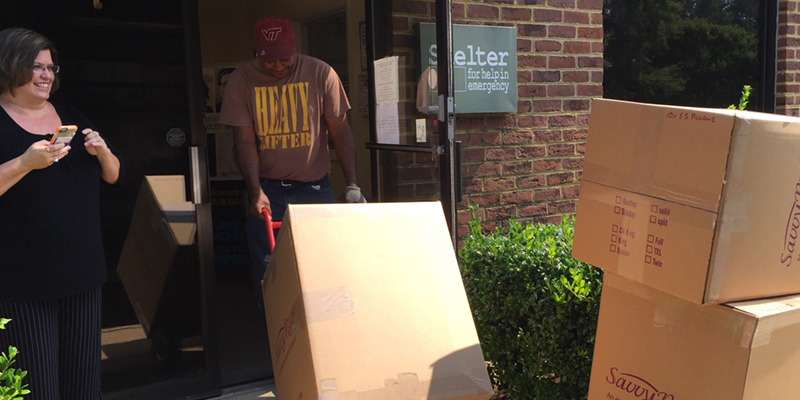
Our staff delivers another round of organic pillows to the Shelter for Help in Emergency. We were greeted by Melissa, SHE’s fiscal director.
Savvy Rest Natural Bedroom recently donated another 100 pillows to the Shelter for Help in Emergency (SHE) in our hometown of Charlottesville, Virginia. These pillows will go to women and children who have escaped dangerous situations. We’re inspired by their resilience and bravery, and we also have deep respect for the employees of the shelter who have dedicated their lives to helping victims of domestic violence. I had the opportunity to sit down with Sarah Ellis, the Fundraising and Development Coordinator of SHE. Read our conversation below.
How long has the Shelter for Help in Emergency been in Charlottesville?
The shelter started here in Charlottesville in 1979, so we’re close to our 40th anniversary. It started off like many battered women organizations. It was really a small group of concerned citizens who had friends or family who were suffering and got together to help them. It moved on from there. A lot of battered women organizations started that way early on, with women banning together and rescuing someone from their home and putting them up in their own house. That changed because people realized that wasn’t necessarily safe to do. Gradually over the years, many organizations have developed and become bigger.
You all take in children as well, correct?
Yes, women and children, and we also take in men too. In terms of shelter for men, we do offer a different service because they cannot come into our residential shelter [for women]. We shelter them in other ways, and offer them the same services.
The shelter [for women and children] has 25 beds. Through that shelter, we serve about 200 women and children a year. We provide services to Charlottesville and the surrounding counties. They typically come from there, but we do take women from out of the area too. For some women, it’s not safe for them to stay in the town that they were living in.
The shelter was built in 2008. Many shelters are repurposed houses, but our residence was built particularly for this purpose.
The main first floor has all of the staff offices, the kitchen, eating area, library, children’s room. The basement has lots of storage, an exercise room, and a play room. The upstairs is divided into units, so we have all of the bedrooms, and depending on the size of the family, people can have adjoining bedrooms to make one unit.

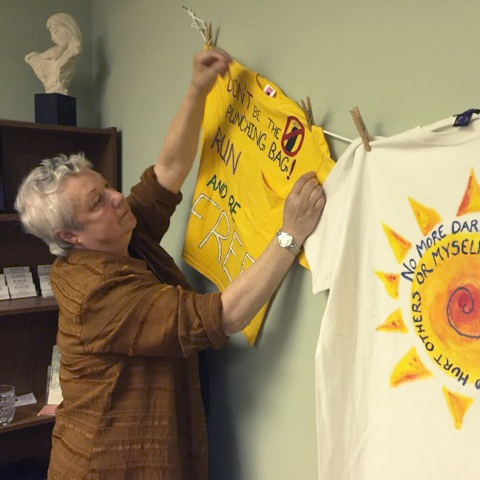
Sarah Ellis hangs inspirational t-shirts in her office at the Shelter for Help in Emergency.
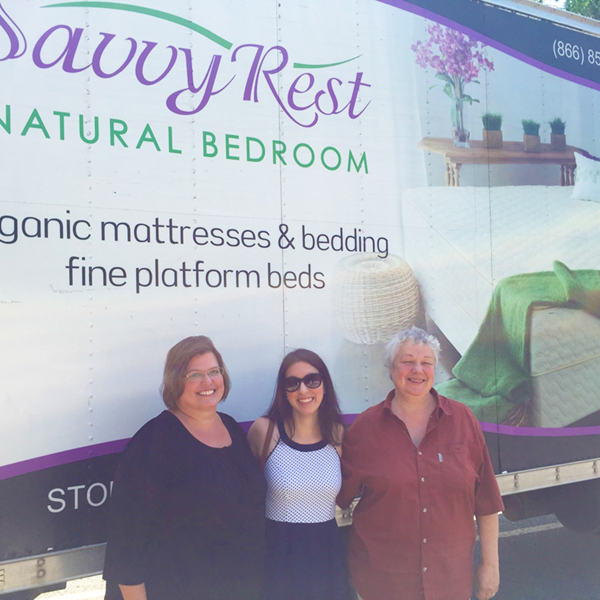
It was a pleasure to meet and talk with Sarah and Melissa. They do such amazing work!

When did you start working for SHE, and what made you want to work for a women’s shelter?
I started here seven years ago. I’ve been working in domestic violence for about thirty years now in different ways. Prior to this, I was working in Brooklyn, and prior to that I was in upstate New York at a shelter. I’ve done many years in domestic violence.
Violence against women has always been an issue that I’ve been concerned about and wanted to work in. When I first started work as a therapist, I was noticing that a lot of my female clients had those kinds of issues.
What is your specific role?
I’m the Fundraising and Development Coordinator. [Some of my responsibilities include] writing grants, working with donors who support us, getting the word out to the community, developing programs, and looking at areas we need to expand and where our services are most needed.
You give women shelter, food, clothes…
Yes, really whatever they need. Some women will come in with absolutely nothing. Some women will just have run and they’ll walk through the doors with the clothes off their back. We do have a fair amount of clothing which has been generously donated by the community.
We give them basic needs, such as washing needs, so toothpaste, toothbrush, soap, shampoo—all of those kinds of things.
Our purpose is to empower women because our victims have been disempowered. That’s what battering does to women—it takes away a woman’s ability to make choices. We don’t want to be another group of people who insist on what she needs to do. She’s the one who has got to find what’s right for her and her family. We have two case managers on-site at the shelter, and they’ll meet with the woman as soon as she comes in to just sit down with her and see what her needs are. It may be that she just needs a few days to recover, that she has a plan to go somewhere, but she just needs a safe space. Or she may have nothing and may have to work from the beginning to find financial support for herself, childcare for her children, a job, housing, etc. It can be any mixture of those things. Women can stay with us for up to six weeks, as we are an emergency shelter. In some situations, we can extend that, so if she’s close to getting an apartment or a job, we will let her stay.

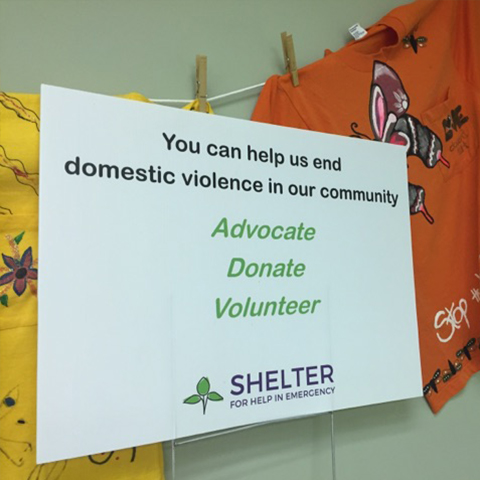
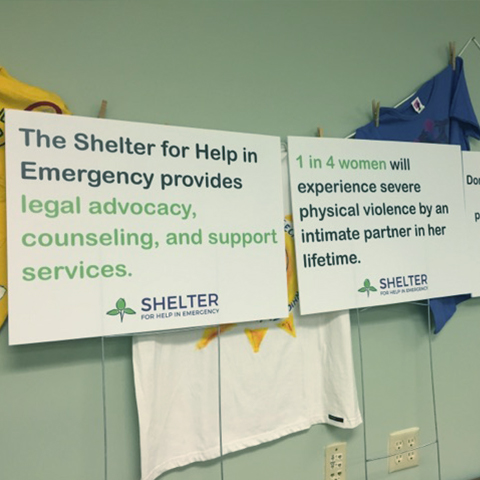

What have you learned from working here?
When people ask what I do and I say I work in domestic violence, usually the reaction is, “oh wow—that must be difficult.” In some ways it is, of course. But I think what inspires me is the courage and the strength of the women we work with. Women are faced with adversity and difficulty, and they find resources and strength to get through it. I’m always inspired.
What is the most rewarding aspect?
A lot of women grow and find their way, and it’s amazing to see them blossom. It’s also wonderful to see the change in children when they come to a safe place, and how they can change very quickly. Children are very resilient for the most part. As much as trauma in childhood is a difficult and challenging experience, if kids get the right intervention early on, they can get through it.
Savvy Rest has donated hundreds of pillows to the shelter over the past few years. How do donations like these make a difference?
It makes a huge difference to us. Obviously we have to supply bedding for all of the people who come here. Before Savvy Rest helped us, we weren’t using the wonderful quality pillows you provide us. It’s been so nice to have Savvy Rest give such a quality product to our women. So many of them say how wonderful it is for them to have a good night’s rest. And then the other beautiful thing is we’re able to let them take the pillow with them, which we didn’t do before because the cost would be too great for us.
Does the shelter have any particular goals for the future?
To end domestic violence. Our mission is to essentially put us out of business, which would be a beautiful thing. I don’t think that’s going to happen in my lifetime, but our goal is to be a safe and supportive place that women and children can come to in order to heal, find their feet, and move on. We want to be as accessible as we can for anyone who needs our services.
Are there ways people in the community can help?
Financial help is always very welcome. Running a 24-hour shelter is an expensive business. We have a lot of costs involved in that. We also take household donations, anything from toilet rolls to shampoo, to whatever is considered a basic need.
I’m pleased to say that we do have a lot of [women’s] clothing at the moment, so I’m not sure we need more of that right now. However, I think we have more need for small children’s clothing. And we always have a need for new women’s underwear. Diapers and feminine products are needed as well.
The other part is volunteering. We have a 24-hour hotline, and we rely on volunteers to help us with that. At any given time we’ll have about 50 active volunteers, but we can never have too many. We do have quarterly trainings for our volunteers. All of our volunteers are thoroughly trained. They need the proper information and skill in order to answer our hotline. Anyone can find out when the next volunteer training is by going to our website or calling us.
If someone doesn’t want to work directly with victims or children, they can always volunteer at one of our events. We do a variety of events throughout the year, and we’re always looking for help.
Is there anything we as a community should know about the shelter that we may not know?
One of our challenges is getting the word out, for a couple reasons. Domestic violence has been a hidden topic historically; people don’t want to talk about it. It’s getting better and being discussed more, so it has become much more of a community awareness. One of the challenges for us is how to be a presence in the community since our shelter has to be confidential. What we don’t have, which many other non-profits have, is the ability to put our clients out there and have them tell their stories. Some do, but most people don’t want [to tell their story]. It’s hard to let the public know what it looks like. Our challenge is having people realize the extent of what goes into getting someone back on their feet. These women are putting their lives back together, which is oftentimes a long task.
If you’d like to donate to SHE, please visit their website. Thank you!